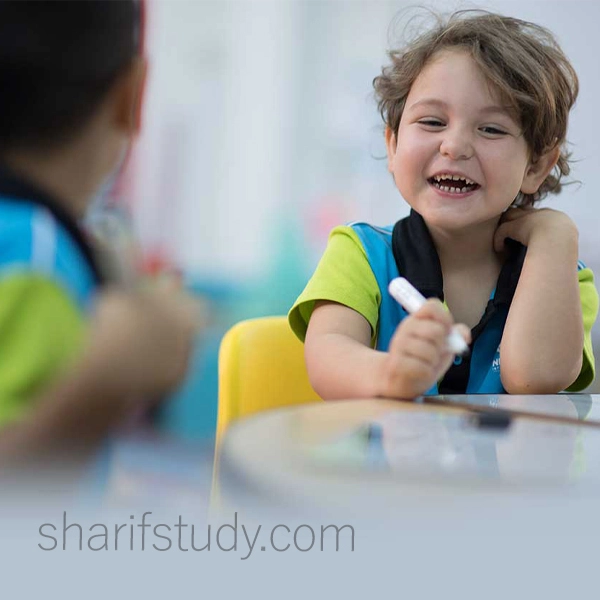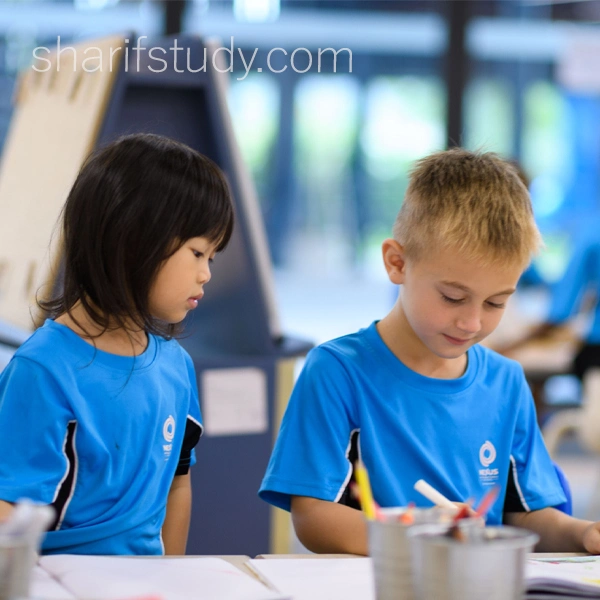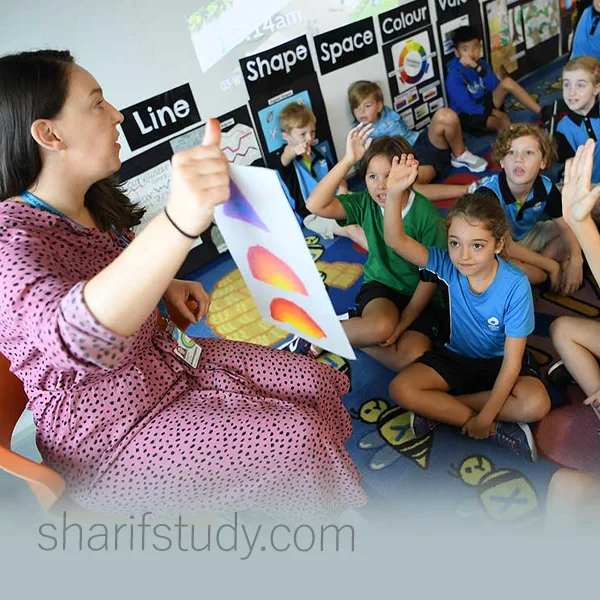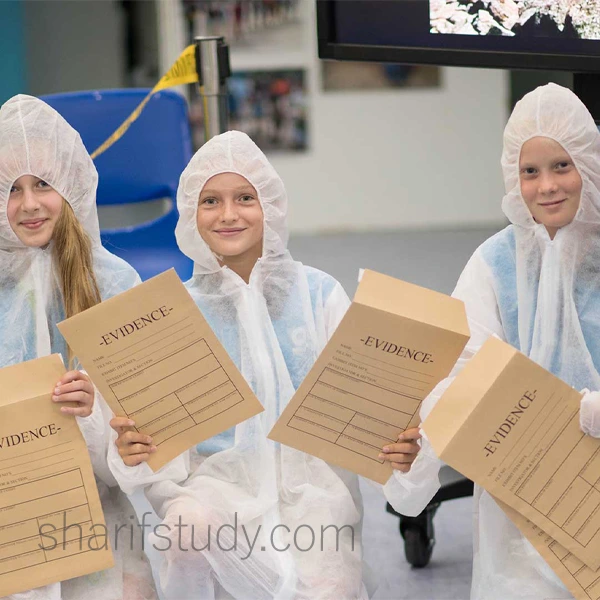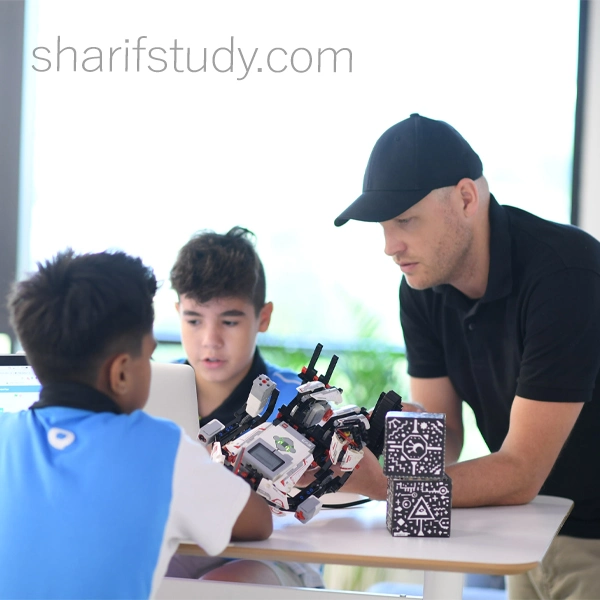Nexus International School Grades are like steps that children climb as they get older and learn more. Courses are different subjects or topics that students learn at each step. Nexus International School has many steps or grades and lots of subjects or courses for students. In this guide, we will tell you more about these grades and courses. This will help you understand what children can learn at Nexus International School.
Early Years
In primary school, learning is all about making your brain stronger by building on what you know and being able to use it in different situations. To help students do their best, they mainly follow the International Primary Curriculum (IPC). They also use the UK National Curriculum and adjust it as needed. The IPC matches up with the UK Curriculum, which makes it easy for the school to use both together.
Globally Recognized IEYC Curriculum
At Nexus, learning takes place in both teacher-led and child-initiated play activities in the Nursery and Reception sections. In addition to encouraging a feeling of wonder and important foundational skills through play-based learning, we are also creating an environment where kids may actively participate in and explore more.
Learning strands are the IEYC framework’s pedagogical unit. With the help of contextualized “Explore and Express” activities, each strand explains what the kids will do and learn. A single IEYC unit of learning, or “theme,” connects all of the learning that occurs throughout the strands. Every theme or subject matters to the global community.
Early Years Program
At Nexus Early Years, they provide learners a nurturing and engaging environment where they spend their day. They thoughtfully design their daily schedule to deliver a curriculum that caters to the needs of the whole child.
Students can choose a range of diverse learning opportunities throughout the day, maintaining a balance between adult-led and child-initiated choices. They keep their schedule flexible to accommodate spontaneous learning opportunities based on our students’ interests. Their aim is to foster their curiosity and help them develop the skills needed to deepen and extend their own learning.
They design a unique learning journey for each student that is personalized and constantly evolves through carefully considered next steps. We regularly update parents on their children’s progress and the experiences of the entire class, sharing them through individualized online learning journals.
Teachers, Parents and Learners’ Relationship
Effective communication between the home and the school is crucial. Any parental conflict is easily picked up by kids, who frequently react negatively or improperly. Come in and talk to us about any issues, concerns, or complaints you may have. They ask that you respect the children’s relationship with their teachers in the same manner that we will never criticize the parents of the children.
They can work together to solve issues if we are aware of them. The kids need to understand that we cooperate and have each other’s backs. They push the kids to be as self-reliant and independent-minded as they can be. Teachers kindly want your assistance in this. They will do everything we can to be accessible to you.
Primary School
In the Primary School, they describe learning as “a unique process where they form or strengthen connections in the brain as they build on knowledge, skills, and attitudes while broadening our understandings and applying these in various circumstances.” They primarily rely on the International Primary Curriculum (IPC) to guide students in realizing their full potential. Nexus also employs the UK National Curriculum and enhance the learning objectives as needed. They have cross-referenced the IPC with the UK Curriculum and have access to this cross-referencing.
The IPC program encourages subject study through a central idea using an inquiry-based, thematic approach. This provides excellent opportunities for students to construct new knowledge with deep understanding and to make relevant connections. They also incorporate the UK National Curriculum into our primary school curriculum, and where necessary, we enhance the math learning objectives.
Nexus strive to provide their students with the best education possible. They expose our Primary students to a broad range of subjects through the International Primary Curriculum. In addition, the teaching team has identified the personal goals they want their students to achieve while in primary school in collaboration with parents and students. They depict these objectives by the Nexus Neuron below, and their teachers strive to deliver lessons in a manner that enables students to acquire these skills.
International Primary Curriculum (IPC)
A curriculum program that is global, current, thorough, and future-focused for students in Early Years 1 through Year 6 growing up in the twenty-first century. It fosters a passion for study and promotes crucial personal traits and critical abilities.
Several core principles are reflected in the curriculum:
- Making connections is a key component of learning, and we make sure that every student has the chance to view the “Big Picture.”
- The ideal learning state is one of relaxed awareness rather than stress.
- Every student has a unique set of skills, and it is our job to figure out how to best challenge each one.
- Learning can be accessed differently by adults and children, thus learners must have access to a variety of chances.
- For “slow thinking,” or complicated thought, time must be set aside.
- For learning to be effective, good health is essential.
Middle School
The creation of the Middle School Curriculum had a specific aim – to ensure a smooth transition from Primary to Upper Secondary.
Building on the educational concept established in our Primary School, the learning program focuses on specialized topic areas. The design of the curriculum equips students with the essential knowledge and skills they need for further learning levels, while considering the importance of their communication, self-management, social, thinking, and research skills.
From Years 7 to 9, students evolve into independent, curious learners, ready to tackle the challenges of the IGCSE examination courses and subsequently the IB Diploma.
Each unit of work at NISM follows a unique and organized learning route.
Subject Information
Personal, Social Development (PSD)
By fostering self-management, relationship-building, social awareness, digital literacy, critical thinking, and health and well-being, the PSD curriculum complements the subject areas. Each year group’s curriculum is taught by tutors, and it is tailored to the needs of students at each Middle School stage.
Mathematics
The mathematics curriculum aims to inspire students to approach mathematics with curiosity, boldness, confidence, and intuition. It challenges learners to investigate, apply, and solve complex problems that often mirror real-world situations, building on core concepts and applications. Teachers continuously encourage students to discuss mathematical concepts and procedures, recognizing that there are various ways to solve math problems.
English
The Middle School English curriculum at NISM aims to foster abilities in precise writing, speaking with confidence, and reading comprehension. These abilities are imparted through the study of various works, both fiction and nonfiction, from a variety of foreign cultures. Every lesson should be read, and students should also write in their weekly reading notebooks.
Science
A combined science curriculum in the middle school at NISM stimulates students’ scientific curiosity by fostering a love of and in-depth comprehension of fundamental scientific ideas and methods. Students can investigate and comprehend the world around them as well as the role that science plays in our daily lives through the curriculum, which combines exciting practical instruction with theory. IGCSE route work starts for students in Year 9.
L.O.T.E (Languages other than English)
Most agree that learning two or more languages enhances communication skills, global awareness, and an international mindset in addition to the core academic subjects of reading, English language literacy, social studies, and mathematics. At NISM’s Middle School, students have the opportunity to learn both European and Asian languages through First Language Mandarin and Bahasa Malaysia, as well as Foreign Language Mandarin, Bahasa Malaysia, French, and Spanish.
Humanities
History, geography, sociology, economics, politics, and religion are just a few of the humanities topics that are covered in the integrated program called “Humanities.” The Middle School curriculum aims to cultivate globally aware, adaptable thinkers with the capacity for independent work and critical thought. In order to develop a thorough conceptual knowledge of the problems, instructors teach students how to develop lines of inquiry and test theories by looking into instances from the real world.
The Arts
At NISM, we believe studying the arts enhances students’ conceptual thinking, awareness, and creativity. In middle school, we consider music, visual arts, and theater as the arts.
In art and design, students explore visual, tactile, and other sensory experiences to express ideas and meanings. They work with traditional and digital media and learn to appreciate and value images and artifacts across different periods and cultures, understanding the contexts in which they were created.
Drama helps students gain confidence as they engage in script writing, generating ideas, and responding to stimuli. They also gain insights into the costumes, props, lighting, and sound departments through the creation of their own performances.
We design the Music curriculum to expose learners to various music styles, instruments, and stimuli. Learners work at their musical level independently and in groups through listening, performance, and composition.
Physical Education (P.E)
Physical health and wellbeing are significant at Nexus. To encourage a sustained interest in sport and physical exercise, the middle school physical education curriculum is created with an emphasis on participation, enjoyment, and physical fitness. The curriculum gives students the chance to select, experiment with, and advance in a variety of conventional, novel, and difficult activities.
Nexus CORE
The CORE curriculum, which is based on the MYP ATLs, aims to give students the tools they need to learn for life, get them ready for the IB Diploma Program, and make sure they can contribute appropriately to local and global communities.
Through the CORE program, students gain knowledge and abilities that are applicable across the curriculum and assist them in “learning how to learn.” The CORE Approaches to learning skills can be studied, taught, practiced, and steadily developed. They give students a strong basis for learning on their own and in groups, and they will help them perform better in their other classes.
IGCSE
People know the International General Certificate of Secondary Education as IGCSE. It stands as the most recognized global qualification for students between the ages of 14 and 16, with offerings in more than 160 countries. Over 3000 institutions globally offer IGCSEs, and several top independent schools in the UK have recently transitioned to IGCSEs. Employers and institutions worldwide accept the IGCSE as a recognition of academic achievement.
Nexus designed the International Baccalaureate Diploma Curriculum to prepare students for the transition from the IGCSE program (IBDP).
IB Diploma
Learners in Years 12 and 13 at Nexus International School Malaysia participate in the International Baccalaureate Diploma Program (IBDP). Designed specifically for students between the ages of 16 and 19, this two-year IB Diploma Program is globally recognized by many universities for entrance into higher education. They construct the IB Curriculum to offer students a broad range of choices, while also allowing them to concentrate on specific areas of interest. Furthermore, if students do not wish to complete the entire program, they offer the option to enroll in the partial IB diploma program (Individual Certificates).
 SharifStudy Best way to Study in Malaysia
SharifStudy Best way to Study in Malaysia


